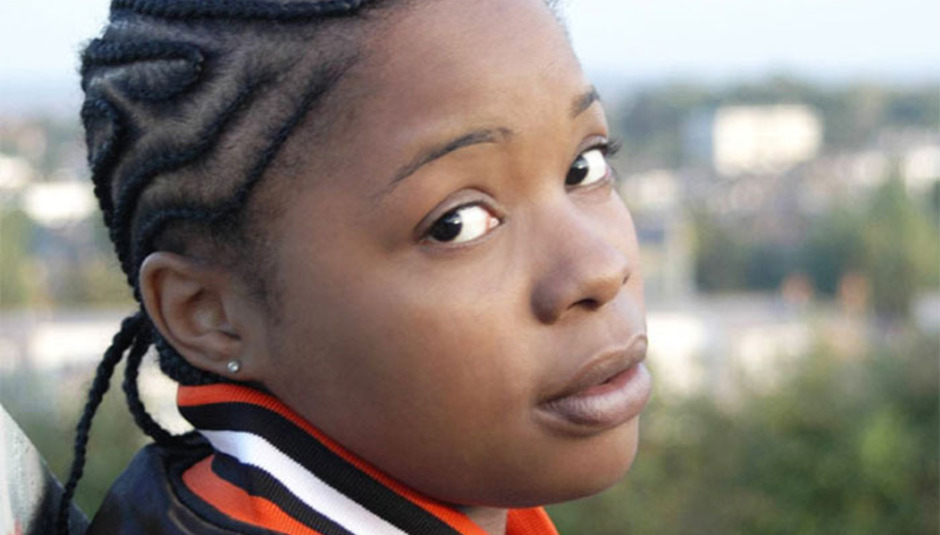This article was originally published back in June but seeing as she won the Mercury Music Prize last night, we thought we'd re-publish it.
Arriving on the UK hip-hop scene with a disarmingly youthful voice and intimate vocal style that’s had hacks spouting the word ‘confessional’ like they’ve just invented a new adjective, 26-year-old South Londoner Speech Debelle is way more than a simple rapper.
Her debut album, Speech Therapy (out this week on Big Dada, the label that brought you Roots Manuva), is proof positive of that, an insightful 13-track journey through her London that was - somewhat ironically - recorded in Australia in late 2007. Extra personnel on the mic are few and far between, although ‘Wheels In Motion’ features a cameo from Roots Manuva himself, while DiS-approved fellow London artist Micachu pops up on ‘Better Days’.
DiS caught up with Speech to talk bad boys, hostel life and frustration directed toward her absent father...
DiS: The record’s penultimate track, ‘Finish This Album’, suggests you’re pretty glad to get Speech Therapy completed and out...
Speech Debelle: Yeah. That’s the song I brought to Big Dada nearly five years ago. It’s the first song I actually completed. I spent a lot of time in the studio making tracks, starting them, but never really finishing any. So that was the first song and the song that got me the deal with Big Dada. It feels very good to finish it, it’s very much an accomplishment.
DiS: Was it a struggle to finish? What were the main stumbling blocks?
SD: Well, I was over there [in Australia] for about six weeks and for about three of them we didn’t really do anything – I think we only managed to do ‘Bad Boy’ – because I’d never worked with musicians before. They have another language. It’s like being in a laboratory with scientists speaking to each other about atoms and stuff. I had to really learn the language but [the album’s producer] Wayne Lotek was my translator. When I would say "Can you play it more happy?" he’d say "Okay, can you change it to major from minor?" Or I might say "Make it softer" and he’d say "Play sustain notes". It was quite a difficult task to make an acoustic hip-hop album in a place I’d never been to on the other side of the world with people I didn’t know!
DiS: Does poetry wield an equal influence on your music as hip-hop?
SD: Yeah, poetry is how I started. Emceeing was a sort of natural evolution. When I was very young I didn’t even know about hip-hop. I was into pop music: Michael Jackson, even some cheesy pop. Then hip-hop came about and I felt like I was able to add my poetry to it. Ten years later I began to meet poets while I was a rapper and now I’m on the other side of it realising it’s actually the same. Rap is just rhythm and poetry together.
DiS: Your writing seems very much from the heart – has your honesty ever landed you in trouble?
SD: Probably! I think actually my lies have got me into trouble, not being honest. Lying comes back to you. There’s nothing you can ask me about the album I’m going to get scared about. If somebody questions me about a song like ‘Bad Boy’ I can speak confidently because who I’m talking about in that song, I know them. I watched them shadow box in a mirror. I looked at their Tupac poster on the wall. It’s the lies that get you into trouble.
Video: Speech Debelle: 'The Key'
DiS: Even though you’re originally from a middle-class background you’ve spent time living in hostels. Was there a lowest ebb that motivated you to put everything into your music?
SD: Oh yeah. Sometimes you gotta get down to get up. But at the same time I think my upbringing helped me. I didn’t grow up with my dad but I had my mum; I had my family, I’ve got aunties who were doctors, it’s quite a middle-class background. I grew up having all the things I wanted, I used to go on holiday a lot, my mum made sure I always had nice clothes. Having that background allowed me to know there was more than what was in front of me. Going on an airplane showed me that even though I’m in a hostel and all I can see out my window is a brick wall, I know there’s more.
DiS: Did Speech Therapy, as the album title suggests, help you resolve any issues, specifically from the tough times?
SD: Yeah, definitely. When I was going out to Australia, a lot of the songs I took over there that became the majority of the album I didn’t even remember writing. I wrote them and put them down for so many years. Once it’s out of the system it’s okay. So yeah it definitely was therapy writing them.
DiS: ‘Daddy’s Little Girl’ addresses your anger at your absent father. Has that resolved any of your feelings toward him? How do you feel about him now?
SD: No, I don’t think I will ever have that out of my system, that’s something I’m scarred for life with. But what I like about that song is that it raises the issue with people; they talk about the song, which is good, because it’s one of those issues that as a society we’ve kind of come to accept, which I don’t think is acceptable. People like that should be treated in the same way a burglar’s treated, you know. Burglars come in your house and steal stuff; my dad stole all those memories from me, it’s theft as well. It’s a way of putting people like that on blast and embarrassing them to a certain extent. I don’t feel bad about embarrassing my father because there’s others like him that it might help if they were embarrassed.
DiS: Do you expect any comeback from your father?
SD: Oh no. No. My dad’s way too nonchalant for that. If he didn’t care for 26 years he’s not going to care now.
DiS: How did your track with Micachu come about?
SD: We were looking for a singer with a British accent so we sent a track to her and she wanted to get on it. To me she made the song a classic, which I was aiming for. At the time I didn’t feel like I had that classic hip-hop song off the album.
DiS: Will you be returning the favour on any Micachu material?
SD: Possibly. She’s really cool, one of the artists I’ve met along the line that definitely any time we both have some free time we’ll hook up and do something.
DiS: Were you a big fan of label-mate Roots Manuva, who also guests on the record?
SD: I was a fan of his achievements, definitely. [Ubiquitous Roots Manuva single] ‘Witness...’ is kind of the classic hip-hop song that I was trying to do. It’s such a monumental song and he’s the most successful UK rapper, so it’s good to be on the label with him. When I signed I was like "How much did he sell?" That’s my benchmark. It’s good having him around to have somebody to try and live up to.






















